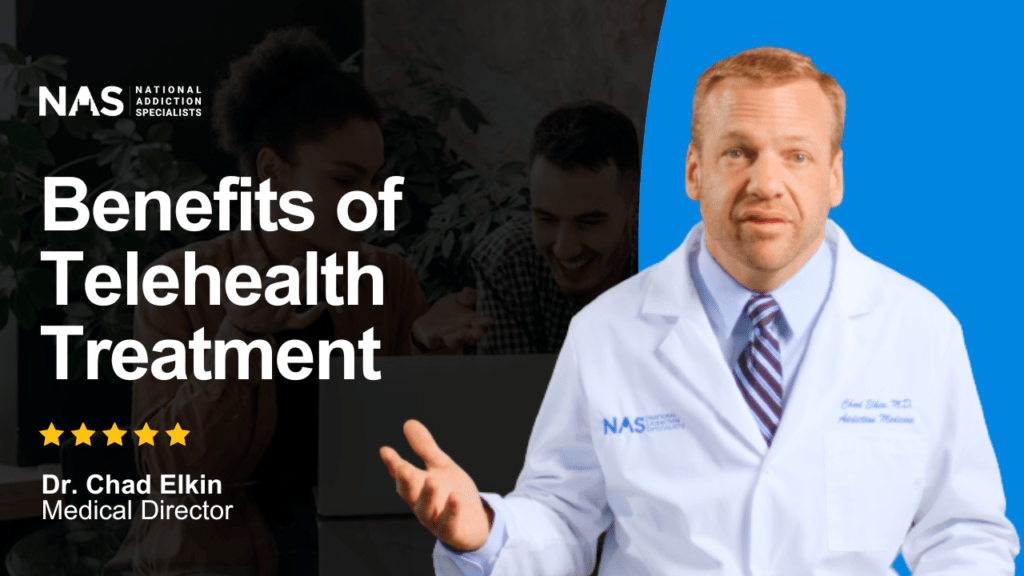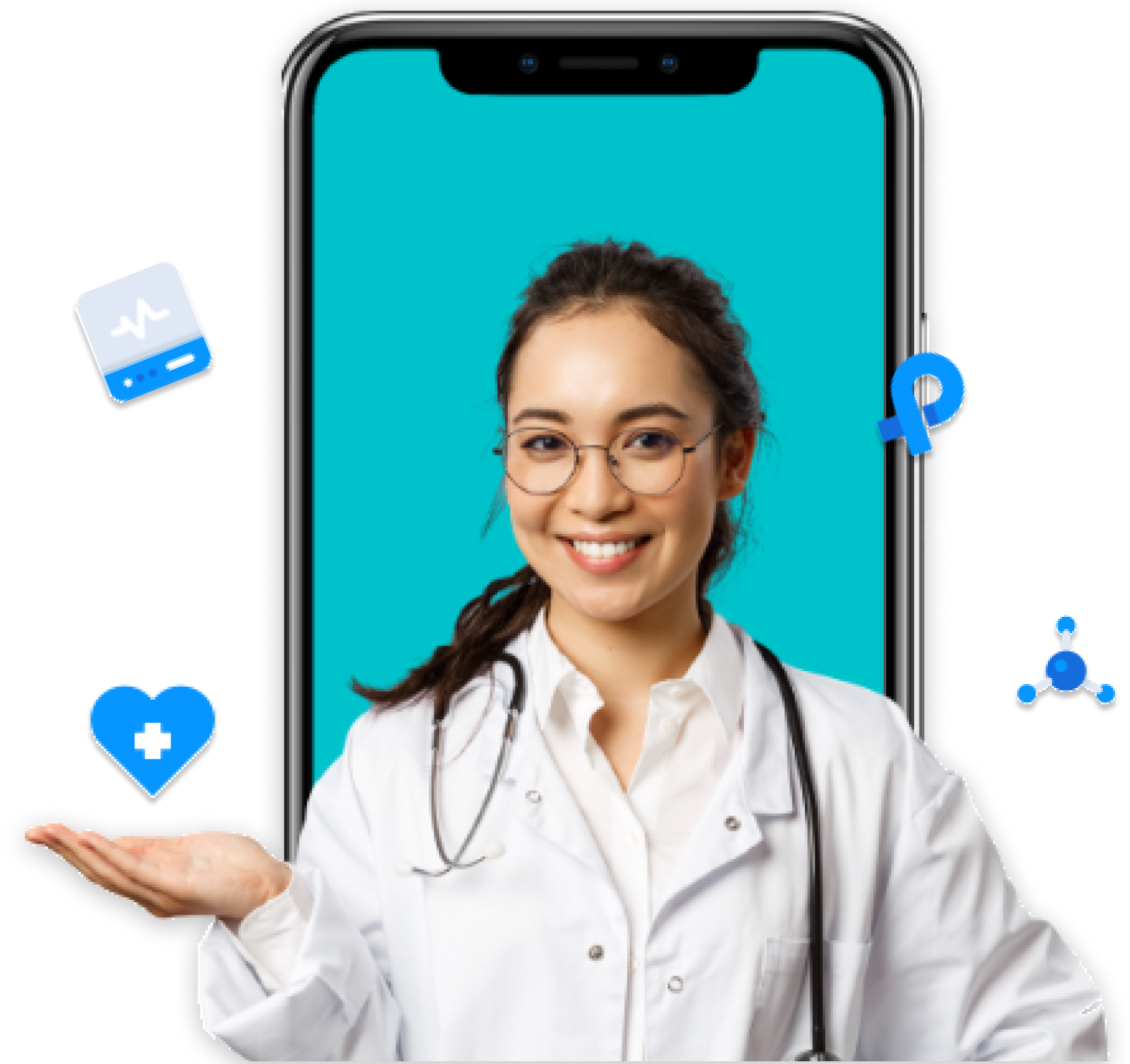Why Finding Insurance-Covered Suboxone Treatment Matters
Suboxone clinics that take insurance near me can be the difference between getting life-saving addiction treatment or going without help. Here’s how to find them quickly:
Quick Search Methods:
- SAMHSA Treatment Locator – Filter by “accepts insurance” and your location
- Call your insurance company – Request in-network MAT providers
- Search state Medicaid directories – Most cover Suboxone treatment
- Consider telehealth options – Many accept insurance and offer same-day appointments
Common Insurance Types Accepted:
- Medicaid/Medicare (covered in all 50 states)
- BlueCross BlueShield, Aetna, United Healthcare
- Most private insurance plans under prescription drug benefits
The opioid crisis affects over 2 million Americans, yet finding affordable treatment shouldn’t add to your stress. Most Suboxone clinics now accept insurance, with over 95% of U.S. counties having at least one buprenorphine prescriber. States with Medicaid expansion have seen a 70% increase in people receiving treatment.
Whether you’re looking for in-person care or telehealth visits, insurance coverage can reduce your costs from hundreds of dollars to less than $10 per prescription. The key is knowing where to look and how to verify coverage before your first appointment.
I’m Dr. Chad Elkin, founder and Medical Director of National Addiction Specialists, board-certified in Addiction Medicine. Over the past five years, I’ve helped thousands of patients steer insurance coverage for Suboxone treatment, including finding suboxone clinics that take insurance near me through our telehealth platform. My goal is to eliminate barriers that keep people from accessing life-saving medication-assisted treatment.
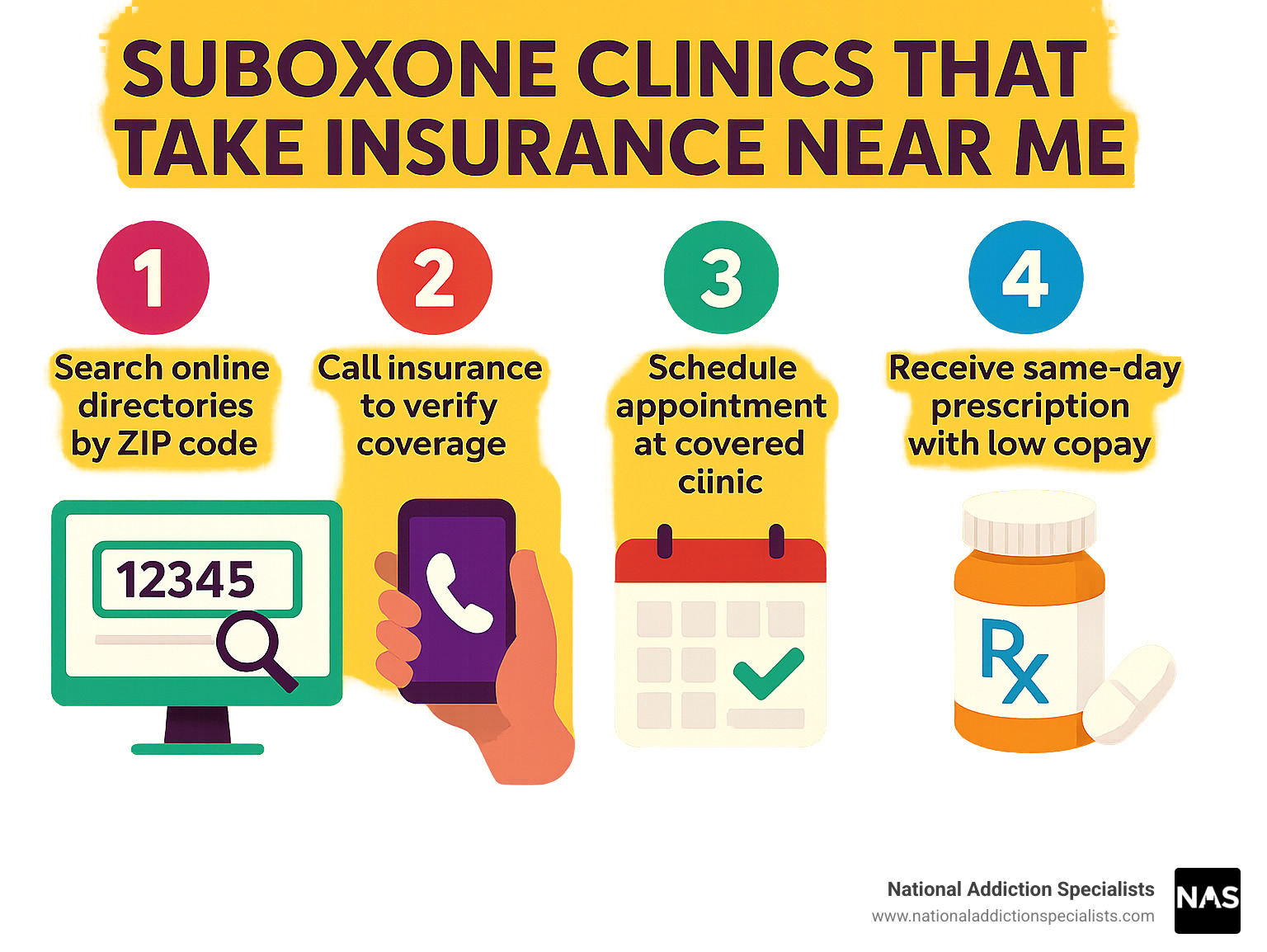
What Is Suboxone & Medication-Assisted Treatment (MAT)?
If you’re searching for suboxone clinics that take insurance near me, it helps to understand exactly what you’re looking for. Suboxone is a prescription medication that combines buprenorphine and naloxone to treat opioid use disorder safely and effectively.
Think of Suboxone as your brain’s helper during recovery. The buprenorphine part works as what doctors call a “partial opioid agonist”—it attaches to the same brain receptors that other opioids target, but in a much gentler way. This means it can reduce cravings and withdrawal symptoms without giving you a dangerous high.
The naloxone ingredient acts like a built-in safety feature. If someone tries to misuse Suboxone by injecting it, the naloxone kicks in and blocks the opioid effects. It’s essentially the medication protecting itself from abuse.
But here’s what makes treatment really work: Suboxone isn’t meant to be used alone. Medication-assisted treatment (MAT) combines this medication with counseling and behavioral support. Scientific research shows this combo approach can cut overdose risk in half and dramatically improve long-term recovery rates.
When you find quality suboxone clinics that take insurance near me, they’ll offer both the medication and the counseling piece. This isn’t just about replacing one drug with another—it’s about giving your brain the stability it needs while you build new coping skills and habits. More info about MAT
How MAT Works Inside Your Brain
Let’s get real about what’s happening in your brain during opioid addiction. Opioid use disorder hijacks your brain’s reward system, making it incredibly difficult to quit on willpower alone. Your brain has been rewired to prioritize opioids above everything else—food, relationships, even survival instincts.
Suboxone works by occupying those same opioid receptors in your brain, but in a controlled, therapeutic way. Instead of the dangerous ups and downs of street drugs or prescription pills, buprenorphine provides steady, predictable relief from withdrawal and cravings.
Here’s the brilliant part: Suboxone has what’s called a “ceiling effect.” This means that after a certain dose, taking more won’t increase the effects. You can’t get higher by taking extra pills, which makes overdose risk much lower than with other opioids. It’s like having a built-in safety brake.
The naloxone component adds another layer of protection. If someone tries to inject Suboxone to get high, the naloxone blocks the opioid effects entirely. This deters misuse while still allowing the medication to work normally when taken as prescribed under the tongue.
This scientific approach is why MAT with Suboxone is considered the gold standard for opioid addiction treatment. Your brain gets the stability it needs to heal while you work on the psychological and social aspects of recovery through counseling. More info about how MAT works
How to find suboxone clinics that take insurance near me
When you’re ready to start treatment, finding suboxone clinics that take insurance near me doesn’t have to feel overwhelming. The good news? There are more options than ever before, and most of them are just a few clicks away.
The fastest way to start your search is with a ZIP-code search on trusted online directories. These tools let you enter your location and immediately filter for clinics that accept your specific insurance type. Whether you have Medicaid, Medicare, or private insurance, you can narrow down your options in seconds.
Your state Medicaid program is another goldmine of information. Every state publishes an updated list of approved Suboxone providers, and many clearly mark which clinics accept different insurance plans. It’s worth checking your state health department’s website—you might be surprised by how many options are available in your area.
Don’t overlook telemedicine options either. Telehealth has revolutionized addiction treatment, offering video visits with qualified providers who can prescribe Suboxone and send your prescription directly to your pharmacy. At National Addiction Specialists, we provide tele-MAT care throughout Tennessee and Virginia, accepting both Medicaid and Medicare for convenient, confidential treatment from home.
If you prefer the direct approach, a quick call to your insurance company can provide you with a complete list of in-network MAT providers. Their customer service team has access to the most up-to-date information about which clinics are covered under your specific plan.
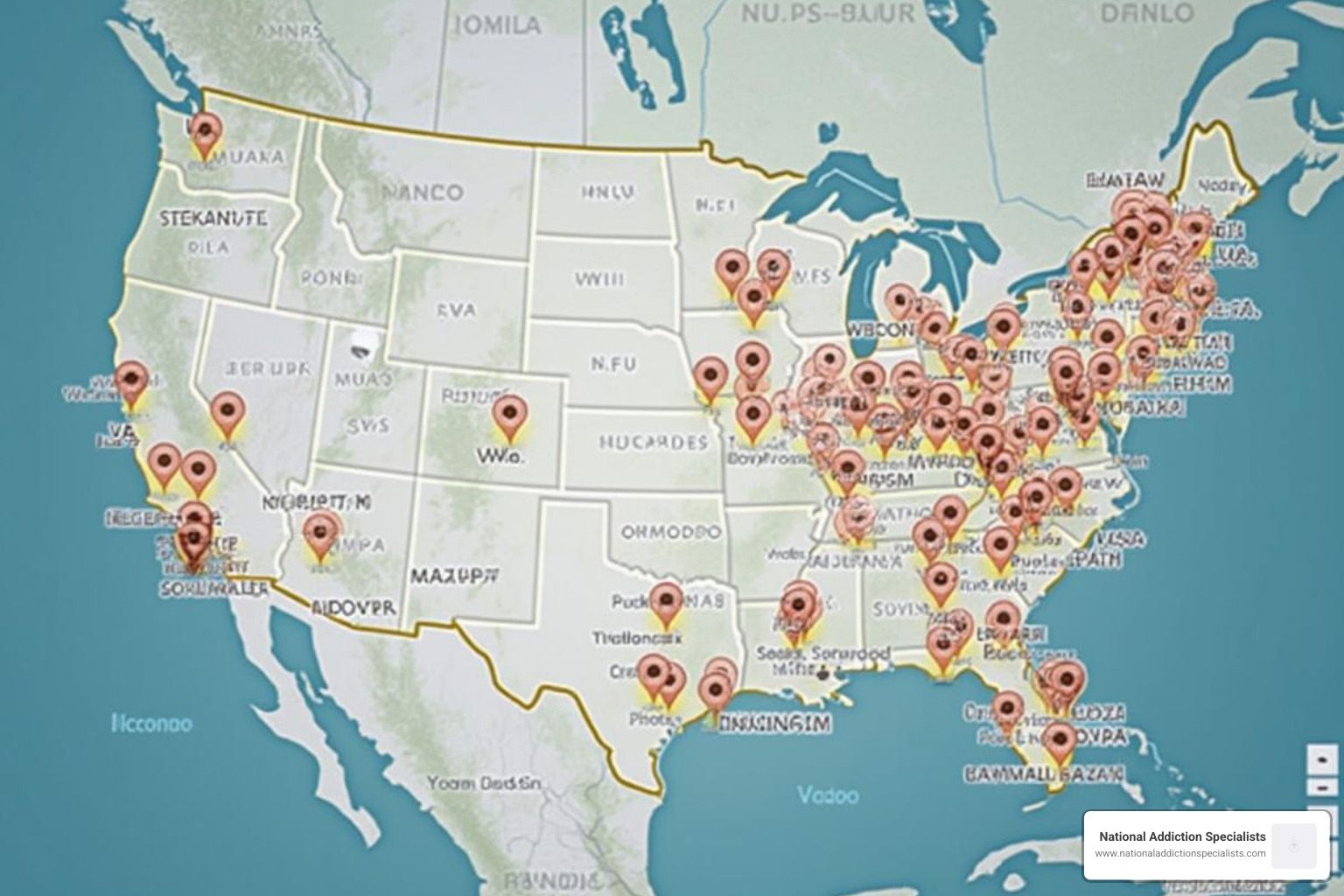
Using Online Directories & Hotlines
Several trusted resources make finding suboxone clinics that take insurance near me straightforward and stress-free. The SAMHSA Treatment Locator is probably your best starting point. This government-run tool lets you search by location, filter by insurance type, and get detailed information about each clinic—all in one place.
If you need someone to talk through your options, the 988 Suicide & Crisis Lifeline isn’t just for emergencies. Their trained operators can help you find local clinics and connect you with support resources. Sometimes having a real person guide you through the process makes all the difference.
Your state Medicaid directory is another reliable resource that many people overlook. These directories are updated regularly and often include helpful details like which clinics offer evening hours or telehealth appointments.
For the tech-savvy, SAMHSA’s Buprenorphine Practitioner CSV provides a downloadable list of all certified buprenorphine prescribers. You can sort by location and cross-reference with your insurance network.
Ready to get started on your recovery journey by telehealth?
Make an Appointment to Treat Addiction
Please don’t hesitate. Make an appointment today.
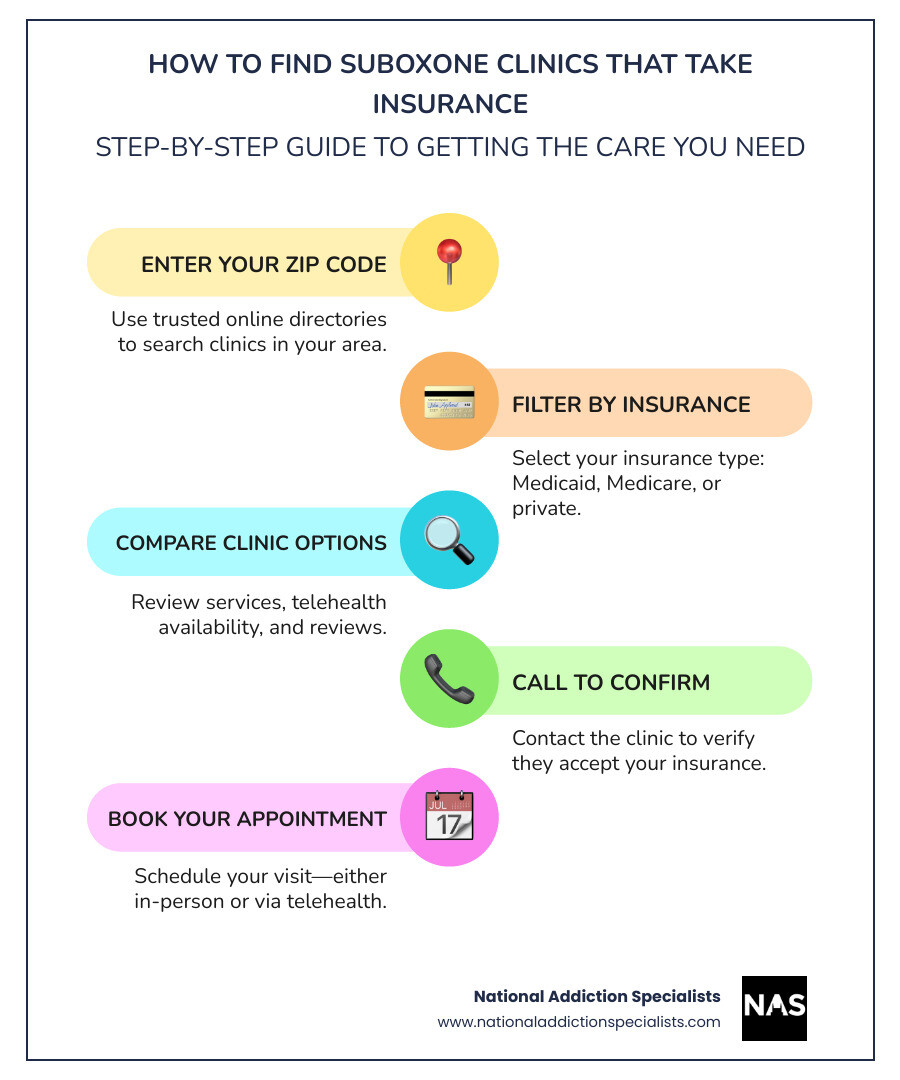
Here’s a pro tip from my years of practice: Always call the clinic directly after your online search. Insurance networks change, and what shows up online might not reflect the most current information. A quick phone call confirms insurance acceptance, appointment availability, and whether they offer telehealth options.
Local vs. Telehealth Suboxone Clinics That Take Insurance Near Me
Choosing between in-person care and telehealth visits often comes down to your personal preferences and circumstances. In-person clinics are ideal if you value face-to-face interactions or need additional services like lab work done on-site. There’s something reassuring about meeting your provider in person, especially when you’re starting treatment.
Telehealth clinics, on the other hand, offer incredible convenience. You can have your appointment from the comfort of your home, receive same-day prescriptions sent directly to your pharmacy, and maintain complete privacy throughout your treatment journey.
This is especially valuable if you live in a rural area where the nearest clinic might be hours away, or if transportation is a challenge. Many of our patients at National Addiction Specialists tell us that telehealth removed the biggest barrier to getting help—they didn’t have to take time off work or arrange childcare for appointments.
The best part? Both options typically accept the same insurance plans. Whether you choose in-person or telehealth care, you can still get the coverage and affordability you need to make treatment sustainable long-term.
Verifying Your Insurance & Cutting Costs
Once you’ve found some promising suboxone clinics that take insurance near me, it’s smart to check exactly what your insurance covers—and how to keep your costs as low as possible.
Start by grabbing your insurance card. You’ll need your member ID and group number handy. Next, connect with the clinic’s billing office—most offer a quick phone call or even an online insurance verification tool. Don’t be shy! This is their job, and they’re used to walking folks through the process.
Be sure to ask if your plan requires prior authorization for Suboxone treatment. Some insurance companies want an extra approval before covering medication, so it’s good to know upfront. While you’re at it, double-check if counseling visits are included. Medication-assisted treatment works best with therapy—and insurance often helps pay for both the doctor and the counseling side.
It’s also very important to ask about your copays and deductibles. Depending on your insurance type, your out-of-pocket costs may be anywhere from $0 to $50 per visit. The good news? Medicaid and Medicare often cover nearly everything, so many people pay little or nothing at all.
Take a look at this helpful comparison:
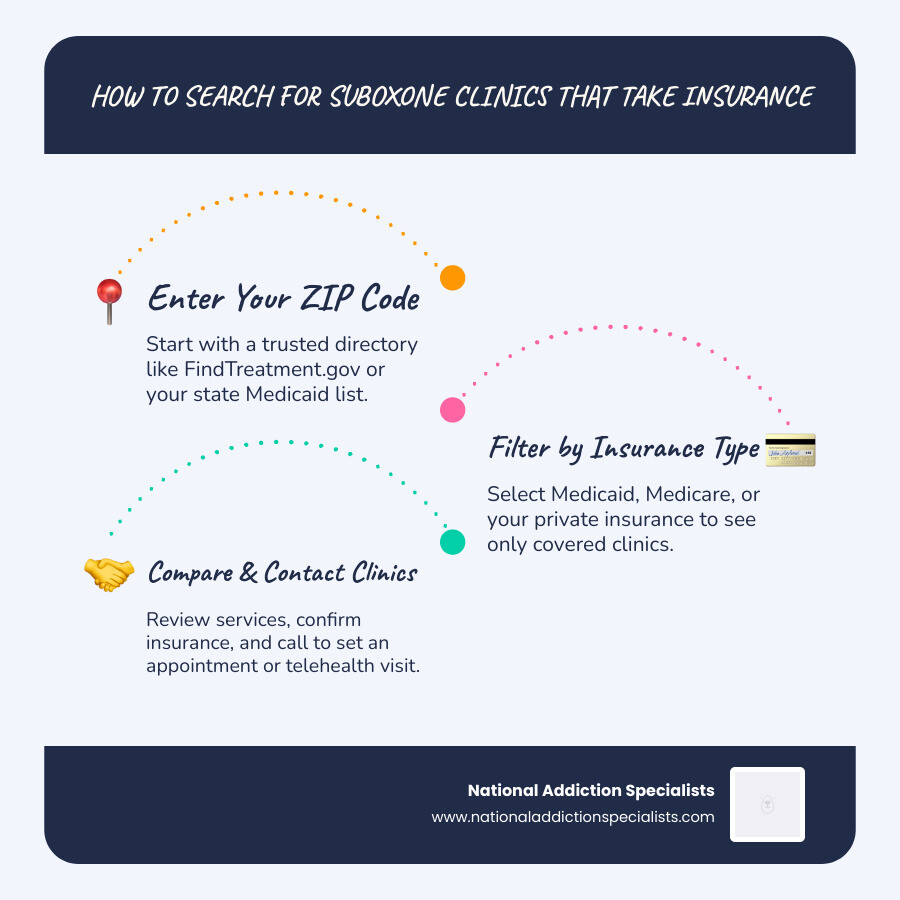
For more details about coverage and what you might pay, check out our page on Insurance & Pricing.
Step-by-Step Insurance Check With a Clinic
Not sure what to say when you call? Here’s a simple script you can use (or copy into an email):
“I’m looking for Suboxone treatment and have [insurance name]. Do you accept this insurance for both doctor visits and prescriptions? Will I need prior authorization? Is counseling covered, and what will my copay be per visit?”
If you call National Addiction Specialists, our team will walk you through every step—and even help with most of the paperwork. You don’t have to steer this alone.
Ready to get started on your recovery journey?
Make an Appointment to Treat Addiction
Please don’t hesitate. Make an appointment today.
What to Expect at Your First Visit
Walking into your first Suboxone appointment can feel overwhelming, but knowing what to expect helps calm those nerves. Whether you’re visiting one of the suboxone clinics that take insurance near me or connecting through telehealth, the process is designed to be supportive and straightforward.
Your provider will start with a thorough assessment of your medical history, current medications, and substance use patterns. This isn’t about judgment—it’s about understanding your unique situation so we can create the best treatment plan for you. We’ll talk about your recovery goals and what success looks like to you.
The Clinical Opiate Withdrawal Scale (COWS) assessment is a quick evaluation that helps determine your current withdrawal level. This guides us in choosing the safest starting dose of Suboxone for your body. It involves checking things like your pulse, sweating, and how you’re feeling overall—nothing invasive or uncomfortable.
Lab testing may include a urine drug screen to understand what’s currently in your system. If you’re pregnant or could be pregnant, we’ll discuss testing options. These tests help ensure Suboxone is safe and appropriate for you right now.
Here’s the good news: if everything looks good, you can often get your same-day prescription sent directly to your pharmacy. With insurance coverage, your copay might be as low as $10-20 for a month’s supply. No waiting weeks for treatment to start.
For telehealth visits, we’ll walk you through our secure video platform before your appointment. It’s user-friendly, and our team is always available to help with any technical questions. Many patients love the privacy and convenience of receiving care from home.
Required Documents & Pre-Visit Tips
Getting ready for your first visit is simple when you know what to bring. Have your government-issued ID ready—whether that’s your driver’s license, state ID, or passport. Your insurance card is crucial too, and make sure you have both the front and back copied or photographed clearly.
Create a list of all current medications, including over-the-counter drugs, vitamins, and supplements. Even if you think something isn’t important, include it. Drug interactions are rare with Suboxone, but your provider needs the complete picture.
If you have recent medical records from other doctors, bring those along. Don’t worry if you don’t have them—we can often request them later if needed.
For telehealth appointments, test your internet connection beforehand and find a private, quiet space where you can talk openly. Make sure your phone or computer is charged and that you won’t be interrupted for about 30-45 minutes.
The most important tip? Be honest and open with your provider. We’ve heard it all before, and nothing you share will shock us. The more accurate information you provide, the better we can help you succeed in recovery.
For more detailed preparation guidance, check out our Suboxone Treatment FAQ. Taking this first step shows incredible courage—you’re already on the path to recovery.
Benefits of Using Insurance for Suboxone Care
If you’ve been searching for suboxone clinics that take insurance near me, there’s good news: using your insurance for Suboxone care can make a huge difference in both peace of mind and your pocketbook.
First, let’s talk about cost. Most patients with insurance—whether Medicaid, Medicare, or private—pay much less than they expect. It’s common for prescriptions to cost under $10, and in many cases, clinic visits are fully covered. Some folks even pay nothing at all for doctor appointments. Insurance helps cover both name-brand and generic Suboxone, and many pharmacies offer additional discounts, so you aren’t stuck paying full price.
But it’s not just about medication savings. Insurance usually covers counseling and behavioral health, which are just as important as the medicine itself. This means you can get access to therapy, case management, and ongoing check-ins—all included as part of your treatment plan. If you’re using Medicaid or Medicare, coverage for counseling and recovery support is especially strong.
Another big benefit is continuity of care. When you use insurance, it’s easier to keep up with appointments and stay connected to your care team for the long haul. This stability is key for lasting recovery—no more worrying about interruptions in your medication or support.
And the research backs this up: scientific studies show that better insurance coverage leads to higher rates of buprenorphine treatment and improved recovery outcomes. In other words, using insurance doesn’t just save money—it makes recovery more achievable and sustainable.
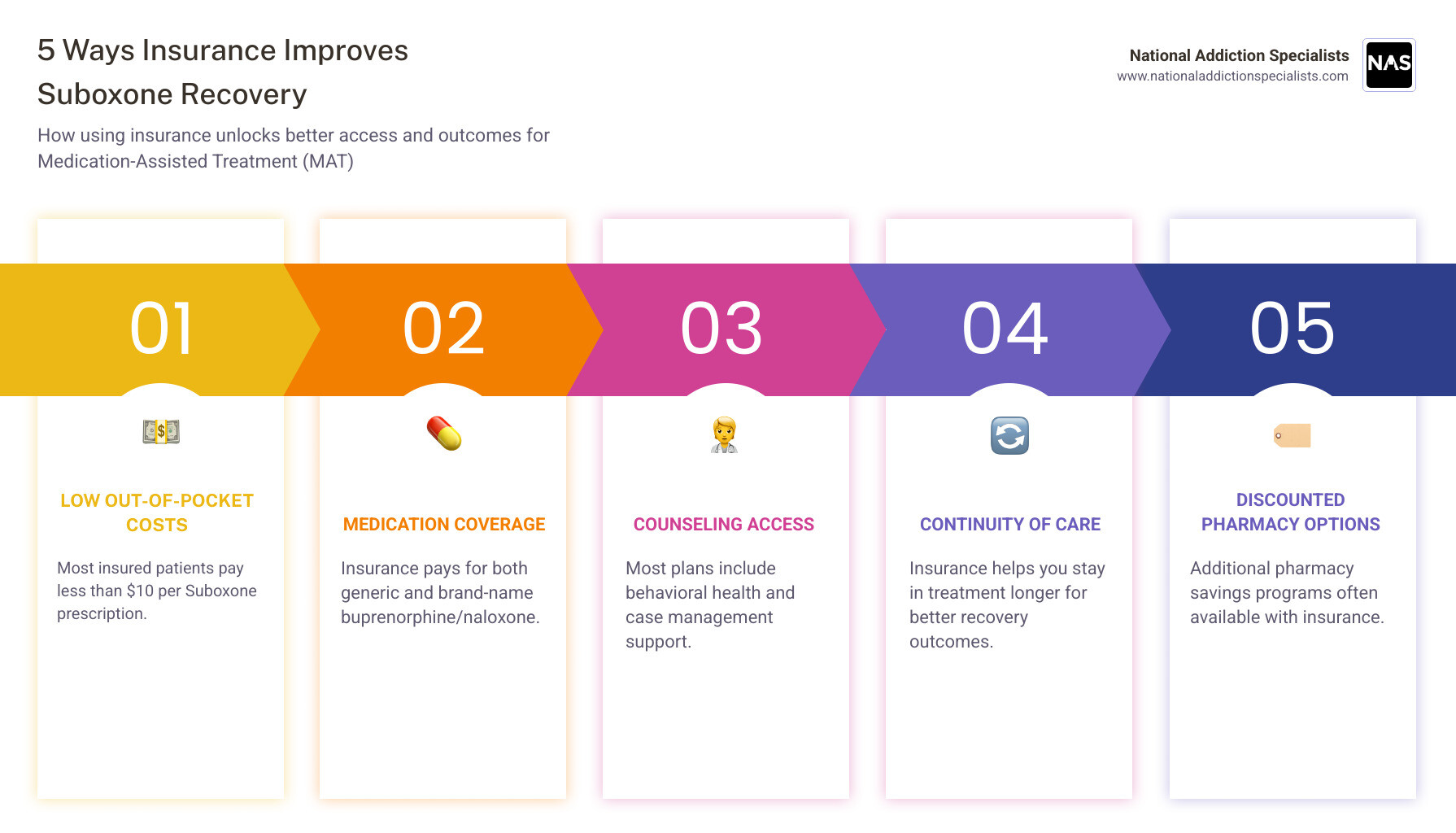
Are There Still Copays?
This is a common question—and the answer depends on your plan:
For Medicaid, most people pay very little or nothing at all. Medicare usually has low copays for doctor visits and prescriptions, but this can vary based on your Part D plan. With private insurance, copays and deductibles can differ, so it’s wise to ask your clinic about sliding scale options or whether you can use pharmacy savings programs like GoodRx. And if you’re uninsured, don’t give up hope—many clinics (including ours) offer self-pay, payment plans, or income-based sliding scale fees.
For more details about how Suboxone is covered and ways to afford your recovery, check out our page on Suboxone for Opioid Addiction.
Getting help should never hinge on what’s in your wallet. By using your insurance, you make treatment affordable, accessible, and more likely to succeed. If you’re ready to take the next step, we’re here to walk you through the process.
Make an Appointment to Treat Addiction
Please don’t hesitate. Make an appointment today.
No Insurance? Alternative Funding & Assistance
If you don’t have insurance or your plan doesn’t cover Suboxone, you still have options:
- Manufacturer Coupons: The makers of Suboxone and generic buprenorphine/naloxone often offer savings cards or coupons.
- State Grant Programs: Many states have funding to help uninsured individuals access MAT.
- SAMHSA Block Grants: Federal grants help cover the cost of treatment at community clinics.
- Sliding Scale Clinics: Some providers adjust fees based on income.
Applying for Patient Assistance Programs
- InSupport Card: Suboxone’s manufacturer offers a discount card for eligible patients.
- Community Health Clinics: Federally Qualified Health Centers (FQHCs) and local nonprofits often provide MAT on a sliding scale.
- Telehealth Self-Pay Plans: Some telemedicine clinics (including us) offer affordable self-pay packages.
Quick-Apply Resources:
- SAMHSA Treatment Locator
- State Medicaid application portals
- Patient assistance program websites (search “Suboxone patient assistance”)
- Local health department or community clinics
Choosing a Quality, Confidential Clinic
Choosing the right Suboxone clinic is one of the most important steps on your recovery journey. Not all clinics are the same, and it’s worth taking a little extra time to make sure you’re in good hands—especially when you’re searching for suboxone clinics that take insurance near me.
A high-quality clinic will have board-certified addiction medicine providers. This means your doctor or nurse practitioner has special training and keeps up with the latest science in addiction care. At National Addiction Specialists, every provider is dedicated to compassionate, expert treatment—so you never have to feel judged or rushed.
Integrated counseling services are also key. True medication-assisted treatment (MAT) isn’t just about a prescription. You deserve access to counseling, peer support, and case management—all of which help you stay on track, manage stress, and rebuild your life. The best clinics make these services an essential part of your care plan, not an afterthought.
Another sign of a quality clinic is outcome tracking. Recovery isn’t one-size-fits-all, and your treatment plan should adjust as you grow. Good clinics check in regularly, offer follow-up appointments, and help you celebrate milestones (yes, we love a confetti emoji 🎉). This support can make all the difference.
Privacy is just as important as care quality—especially if you prefer confidential, telehealth-based visits. Your clinic should follow strict privacy policies to protect your information. Telemedicine adds another layer of comfort: you can get support from home, on your schedule, and know your details are safe.
Finally, look for flexible hours. Life is busy, and appointments that fit your routine (including evenings and weekends) can help you stick with treatment. At National Addiction Specialists, we make it easy to find a time that works for you.
If you’re ready to take the next step, start by finding addiction specialists near you, or reach out to our team directly.
Red Flags to Avoid
Unfortunately, not every clinic has your best interests at heart. Watch out for cash-only “pill mills”—these places just hand out prescriptions, skipping counseling and ongoing support. That’s not safe, and it’s not true recovery care.
Be wary of any clinic that doesn’t offer counseling alongside your medication, or that skips routine follow-up testing like urine drug screens. These are essential parts of high-quality, evidence-based care. You deserve a team that helps you every step of the way.
Ready for confidential, quality care from home?
Make an Appointment to Treat Addiction
Please don’t hesitate. Make an appointment today.
Frequently Asked Questions About Suboxone Clinics That Take Insurance Near Me
Looking for suboxone clinics that take insurance near me often brings up a lot of questions—and sometimes, a little anxiety. Let’s clear things up and help you feel confident about taking your next steps toward recovery.
How do I know if a clinic accepts my Medicaid or Medicare plan?
The easiest way is to just give the clinic a call and ask, “Do you accept my [Medicaid or Medicare] plan for both doctor visits and Suboxone prescriptions?” Most clinics are happy to check for you right on the spot. You can also double-check by visiting your state Medicaid website, or by calling the customer service number on the back of your insurance card. If you prefer, some clinics (including National Addiction Specialists) have quick online verification tools that walk you through the process.
Can Suboxone be prescribed completely online under current rules?
Yes—thanks to changes since the COVID-19 Public Health Emergency, it’s now possible for most people to start Suboxone treatment from the comfort of home. Telehealth clinics can handle your entire initial visit and prescription virtually. This means you can meet your provider by video, get evaluated, and often have your prescription sent to your pharmacy the very same day, all without stepping outside. State laws can vary, but in Tennessee and Virginia, this is a fully legal and widely used option.
What support services (counseling, case management) should I look for?
The most effective recovery plans don’t just include the medication—they also connect you to a caring support team. Look for clinics that offer individual or group counseling, as talking things through really does make a difference. Case management helps you sort out insurance, housing, or job issues, which can be a big relief. And peer support services give you encouragement from people who know exactly what you’re facing. These extras aren’t just “nice to have”—they’re shown to boost your chances of long-term recovery.
If you’re ready to find a supportive, insurance-friendly clinic, our team at National Addiction Specialists is here for you.
Make an Appointment to Treat Addiction
Please don’t hesitate. Make an appointment today.
Conclusion
Recovery is not just possible—it’s within reach, and you don’t have to go it alone. Today, there are thousands of providers across the U.S., and with so many suboxone clinics that take insurance near me, starting on the path to healing is more convenient than ever. Whether you’re looking for an in-person clinic or would rather talk to a caring provider from the comfort of your own home, help is out there—and it’s affordable.
At National Addiction Specialists, we believe everyone deserves a chance at recovery with dignity and support. Our tele-MAT program makes it simple: confidential Suboxone care on your schedule, with expert clinicians who truly listen. We accept Medicaid, Medicare, and most major insurance plans across Tennessee and Virginia, so your focus can be on getting better—not worrying about cost or paperwork.
Every recovery journey begins with a first step. If you’re ready to explore your options, we’re here to help you every step of the way. Recovery doesn’t have to be a lonely road—and you don’t have to wait another day to get started.
Make an Appointment to Treat Addiction
Please don’t hesitate. Make an appointment today.
If you’d like to learn more or set up a telehealth Suboxone appointment, click here to get started. Your future self will thank you.
This article was medically reviewed by:
Chad Elkin, MD, DFASAM is a board-certified addiction medicine physician, founder, and Chief Medical Officer of National Addiction Specialists, dedicated to treating substance use disorders. A Distinguished Fellow of the American Society of Addiction Medicine (ASAM), Dr Elkin currently serves as President of the Tennessee Society of Addiction Medicine (TNSAM) and has held various leadership roles within the organization. Dr Elkin chairs ASAM’s Health Technology Subcommittee and is an active member of its Practice Management and Regulatory Affairs Committee, State Advocacy and Legislative Affairs Committee, and other committees. He also serves on the planning committee for the Vanderbilt Mid-South Addiction Conference. Committed to advancing evidence-based policy, Dr Elkin is Chairman of the Tennessee Association of Alcohol, Drug, & Other Addiction Services (TAADAS) Addiction Medicine Council, which collaborates with the TN Department of Mental Health & Substance Abuse Services (TDMHSAS). He has contributed to numerous local, state, and national task forces, helping develop professional guidelines, policies, and laws that align with best practices in addiction medicine. His work focuses on reducing addiction-related harm, combating stigma, and ensuring access to effective treatment. Passionate about the field of addiction medicine, he remains dedicated to shaping policy and enhancing patient care.
Suboxone® and Subutex® are a registered trademark of Indivior UK Limited. Any mention and reference of Suboxone® and Subutex® in this website is for informational purposes only and is not an endorsement or sponsorship by Indivior UK Limited.


